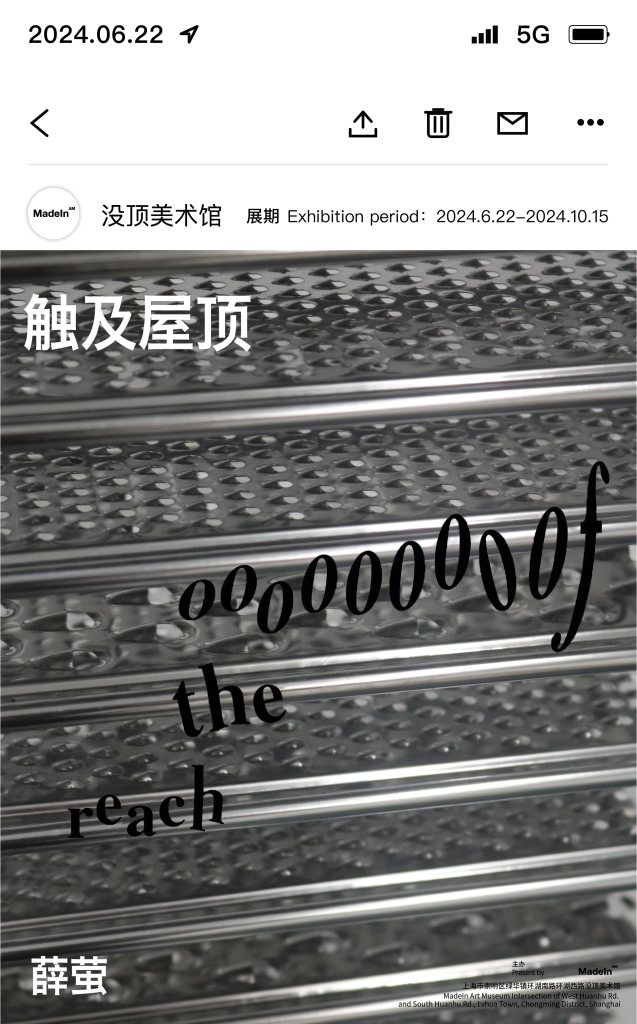







没顶美术馆将于2024年6月22日呈现年轻艺术家薛萤的个人项目“触及屋顶”。薛萤从2018年起开始关注和从事女性主题的研究,在本次项目中,艺术家将通过对日常生活材料的使用和实践,用更加私人化的视角讨论家庭工作与资本的关系,并用跨学科的方法讨论当代女性生活的困境,对抗策略与女性叙事的更多可能性。
艺术家自述
一个月前,我搬到了上海马场的工作室进行驻地。两位马场老板经营的艺术品运输、制作与搭建的公司园区,成为了我暂时的工作空间。因此,在日常生活里,我得以更近距离地观察到材料处理与制作的现场。第一件作品《梯子》便是在这样的时机和地点完成,这件作品的材料基本上都回收于制作画框、运输木箱或者搭建展览现场时所剩下的边角料,看见资本工厂的背后与角落是我的工作。在此之前,我一直在通过“制造失能的工具”来讨论资本的功利主义,以及与社会性别角色之间的关系。在马场的驻留期间,引起我兴趣的并非是艺术现场的资源浪费或流动,而是工厂中普遍存在的显性的男性劳动与隐性的女性劳动,以及在看似稳固秩序与结构中,那些处于底层的减震缓冲地带。
长期以来我对发生在家庭内的困境,那些“被期待去劳动”的女性时刻进行了大量的批判。在创作实践中我经常使用许多一眼可以识别出的日常材料或工具。尝试将女性被符号化,工具化的身体进行某种再现,去揭示家庭工作的本质是一种枷锁,家庭主妇生活的每时每刻都在为资本积累而服务的事实。家庭工作或家庭妇女并非仅仅作为受害者处于资本中的边缘,而是同样处于资本剥削的中心地带,生产大量的剩余价值。家庭工作很大程度地保障了资本获得它的存续,扩张所需要的一切劳动力,“自我驯化”发生在“工厂”,同样地也发生在“家庭”,在这一点上女性困境并无公私领域之分。
在这一次展出的项目中,我以相对私人化的视角去讲述“自我驯化”“牺牲”“奉献”,家庭几代女性之间内化的创伤,讨论女性的个体和代际创伤与资本剥削之间的关系。家庭对我来说一直是很重要的创作动机,我通过思索和感受“家”,能洞见许多与社会、群体,甚至超越三维世界的许多相应,这也是照见自己的过程。我在发生变化,家里的每个人、每个生物时时刻刻也都在变化。同时,社会中对于“家”的认知也在变化。家是一个现在进行时态,它关乎物理居所、人与人的关系、权利与欲望、母职、爱、生命的经验等。我是通过看见家,看见家中女性真实的身影,从而看见更大的群体的。
西尔维娅·费代里奇曾提出:“左派认为,作为家庭主妇,妇女不是在受资本之苦,而是在受资本缺失之苦。我们的问题似乎是资本从未能进入我们的厨房和卧室,这带来了双重后果,我们大概还停留在封建社会的前资本主义阶段,无论我们在厨房和卧室里做什么,都与社会变革无关。很显然,如果我们的厨房不属于资本,那么我们为摧毁它们而进行的斗争就永远不会成功地导致资本衰落。”
“触及屋顶”这个项目是以朴素的女性生活经验而展开的对于女性叙事的思考。以灶台之火,照亮黑暗的、巨大的沉默;重新发现家务劳动本身的性质和范围,看见厨房和卧室里面与外面发生的事。正如勒古恩(Le guin)在其著作《What Women Known》中所写的那样:我们需要重新审视家和养育的意义,它是人类最古老、最伟大、最重要,也是对智识要求最高的劳作。
(致谢马场 Courtesy MACHANG)
关于薛萤
薛萤(yy?, b.1993),出生并成长于山东,中国。她的作品涵盖了社会实践、装置、纺织和文本。她曾就读于利兹大学(利兹,英国),于2016年获得时装与面料学士学位,随后在皇家艺术学院(伦敦,英国)学习,于2019年获得公共领域的硕士学位。她的实践反映了她对女性主体在父权制中的地位的长期兴趣,通过研究女权主义哲学与激进行动、亚洲家庭内部的权力动态进行批判性的社会实践,延展围绕多元社区的想象。

MadeIn Art Museum will present emerging artist Xue Ying (yy?)’s solo project, Reach the ooooooooof, on June 22, 2024. Since 2018, yy? has been focused on and engaged in women’s studies. Through the use of everyday materials and an interdisciplinary approach, this project explores the relationship between domestic labour and capital from a private perspective in order to identify the dilemmas women are facing today, feminist confrontational strategies, and more possibilities for female narratives.
Artist’s Statement
A month ago, I started MACHANG residency in Shanghai, Jiading. My temporary workspace was at JART, where two Mr. Ma run the transportation, production, and construction of artworks. I was able to observe the production site and material handling site more closely in my daily life. That’s when Ladder was made. Materials used in this piece were typically left over scraps from making painting frames, transporting crates, or constructing the exhibition site. Seeing the back and corners of the capital factory was my job. In part of my previous practice, I discussed the utilitarianism of capital and its relationship to gender roles in society through re-making dysfunctional tools. A major interest of mine during my residency at MACHANG was not waste or flow of resources in art scenes, but rather the prevalence of explicit and implicit male and female labour, as well as the shock-absorbing buffer zones beneath what appears to be an orderly system and structure.
For years, I have been critical of women’s roles at home—those moments when they are “expected to work.” I often use everyday materials or tools that are instantly recognizable. I attempt to reproduce the symbolic, instrumentalized body of the woman in order to reveal the fact that domestic work is essentially a kind of shackle and that every moment of the housewife’s life serves capital accumulation. Domestic work or the housewife, is not merely on the periphery of capital as a victim, but is equally at the centre of capital’s exploitation, producing large amounts of surplus value. Domestic work largely guarantees capital all the labour it needs for its survival and expansion. The “domestication of the self” takes place in the “factory” as much as in the “home”. A woman’s dilemma is not separated by public or private spheres.
This project examines self-domestication, sacrifice, and dedication, as well as internalized trauma among generations of women in the family, and discusses the connection between interpersonal and intergenerational trauma as well as women’s exploitation of capital. Home(Love?) has always been one of my most important motivations. For me, it can provide insights into many correspondences within society and community, as well as self-perception beyond the material world. We are changing constantly. ‘ ‘Home’ is changing in society’s perceptions as well. This is a narrative in the present tense. It encompasses physical shelter, links and bonds, rights and desires, motherhood, love, and individual experiences. Seeing the ‘home’ and seeing the women as they truly are enables me to see the larger community.
Silvia Federici once proposed: “The left believes that as housewives, women suffer not from the presence of capital but from its absence. Our problem seems to be that capital has never managed to enter our kitchens and bedrooms, leading to a dual consequence: we remain in a pre-capitalist, feudal stage, and whatever we do in our kitchens and bedrooms is irrelevant to social change. Clearly, if our kitchens do not belong to capital, our struggle to destroy them will never successfully lead to the decline of capital.”
Reach the ooooooooof is a reflection on female narratives based on the modest experiences of everyday women. Seeing what happens inside and outside the kitchen and the bedroom is illuminated by the fire of the stove, rediscovering the nature and scope of domestic labour itself. As Leguin writes in her book What Women Known: we need to rethink the meaning of home and nurturing as mankind’s oldest, greatest, and most important intellectual labor.
(Courtesy of MACHANG)
Xue Ying (yy?)
Xue Ying (yy? b. 1993), was born and raised in Shandong, China. Her works encompass social practice, installation, textiles, and text. She studied at the University of Leeds (Leeds, UK) and obtained a bachelor’s degree in Fashion and Textiles in 2016. She then studied the Royal College of Art, London, UK obtaining her MA in Public Sphere in 2019. Her practice reflects her longstanding interest in the position of the women’s subject within patriarchy, making critical social practices through researching feminist philosophies and activism, the power dynamics within the Asian family, also expanding the imaginaries around the polyphyletic community.

